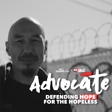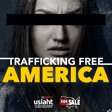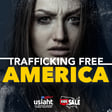
What Survivors of Sex Trafficking Really Need: Legal Hurdles and Community Gaps in Survivor Support, Part 2 | S6, E2
In Part 2 of our powerful conversation with Bekah Charleston, survivor and advocate, we go deeper into the realities victims of sex trafficking face after rescue—from unpaid debt and criminal records to community disconnection and spiritual burnout.
Hosted by the Trafficking Free America Podcast, a production of the U.S. Institute Against Human Trafficking and Kids Not For Sale, this episode tackles the often-overlooked legal, financial, and relational obstacles that survivors must overcome—and how you can help eliminate them.
🔍 Key insights in this episode:
- The 3-step framework of survivor care: escape, safe home, restoration
- Why many survivors face prison, debt, and legal barriers post-trafficking
- How to support real rehabilitation without a “savior” complex
- Actionable ways churches and communities can become part of the solution
- The importance of removing judgment and centering love in this work
📌 Timestamps
00:00 – Recap and framing the rehabilitation journey
00:46 – Safe home vs. restoration home: a critical distinction
04:19 – What survivors face after “the life”: legal records, debt, prison
07:08 – The DEBRA project and how survivors access legal support
08:24 – Why we need nationwide pro bono legal resources
09:37 – Bekah’s nonprofit experience and vision for scalable services
12:27 – Can lack of resources cause survivors to return to trafficking?
14:36 – Federal vs. state support—what’s missing, what can we do?
15:07 – Where survivors feel supported—and where it drops off
18:57 – Government vs. society: who should be solving this?
21:33 – How churches can wrap around survivor care and prevention
23:06 – Practical ways churches can start helping now
25:05 – Two resources Bekah recommends for getting involved
26:22 – Why a “hero” mindset can do more harm than good
28:13 – Bekah’s vision for the next four years of survivor support
31:24 – Final thoughts: it’s time to step up and do the work
🙏 Whether you're a pastor, advocate, policymaker, or everyday person—this episode will help you shift from well-meaning to well-doing in the fight against human trafficking.
👉 Learn how to join our movement at: https://usiaht.org/abolitionist
🔔 Subscribe to catch more survivor voices, strategies for prevention, and real-world solutions.
#HumanTraffickingAwareness #SurvivorJustice #BekahCharleston #TraffickingFreeAmerica #USIAHT #KidsNotForSale #RestorationJourney #ChurchAndJustice #AntiTraffickingPodcast #AbolitionistMovement

![The Best Ways to Support a Safe Home [REPLAY] | Safe Home Series, Part 4 image](https://media.zencastr.com/cdn-cgi/image/width=112,quality=85/image-files/640a1493181f834e694b13d6/20777798-06ea-438b-8fe4-26e91f8b685e.png)

